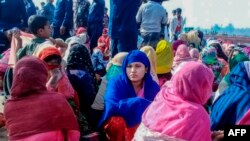The U.N. refugee and migration agencies are jointly appealing for $877 million to aid 855,000 Rohingya refugees, most of whom fled violence and persecution from Myanmar three years ago, and more than 444,000 vulnerable Bangladeshis hosting them.
More than half of the money will provide vital services, including food, shelter, clean water and sanitation. The rest of the appeal will be used for health, protection, education, site management, energy and environmental needs.
Shahriar Alam of Bangladesh’s Ministry of Foreign Affairs says his government has welcomed this large exiled population within its midst. But he acknowledges their presence poses challenges and that the solution to the plight of the Rohingya refugees is repatriation to Myanmar when that becomes possible.
But this is unlikely to happen, he says, without the vigorous support of the International community.
“We expect that U.N. member countries to do more and work closely and do everything possible to put pressure on Myanmar to take their citizenship back in a manner, a repatriation that is safe, voluntary, and dignified,” Alam said.
UN High Commissioner for Refugees, Filippo Grandi agrees that Bangladesh deserves support for hosting nearly one million Rohingya. He laments the short attention span of the media and the international community who quickly move from one crisis to another.
As a consequence, he says the Rohingya have become largely forgotten. He agrees with the Government of Bangladesh that the solution continues to be in Myanmar.
“The problem is that things that need to be done there to create conditions for refugees to return from Bangladesh into Myanmar are too slow or not happening yet--freedom of movement, return of internally displaced people that are in camps in Rakhine State,” Grandi said.
Grandi says those who return should be granted housing, land, and property rights and be given the education and training they need to be able to work. But the most fundamental step of all, he says, is for the Rohingya to be given a path to citizenship.
The Rohingya who have lived in Myanmar for generations were stripped of their citizenship in 1982.





